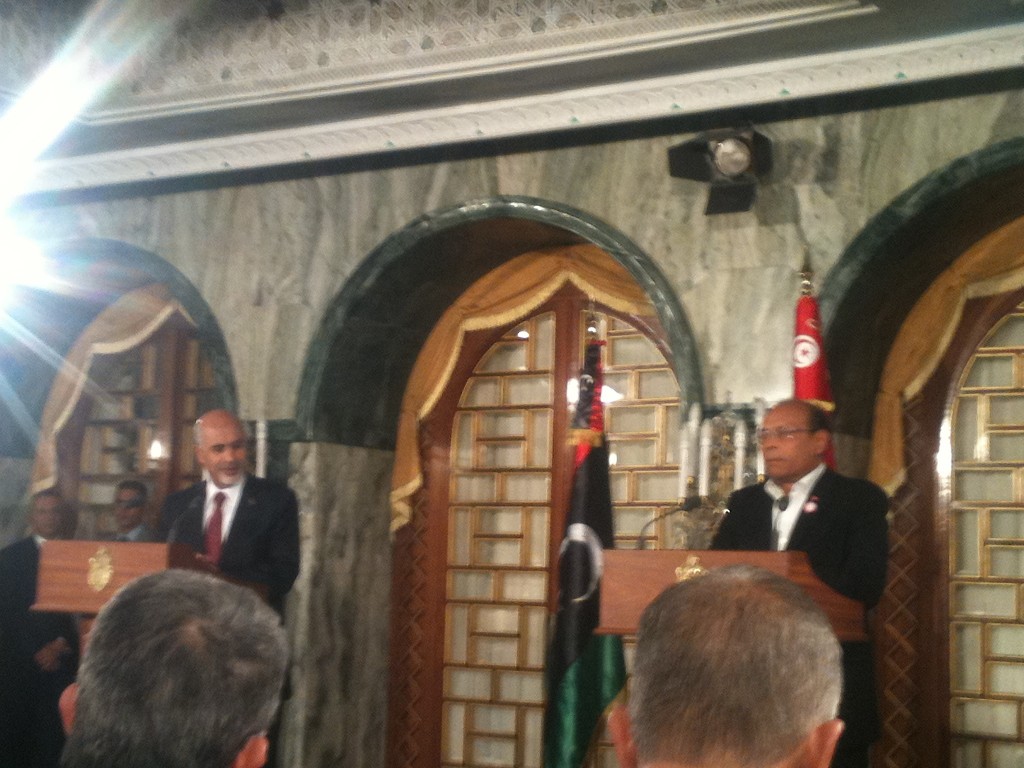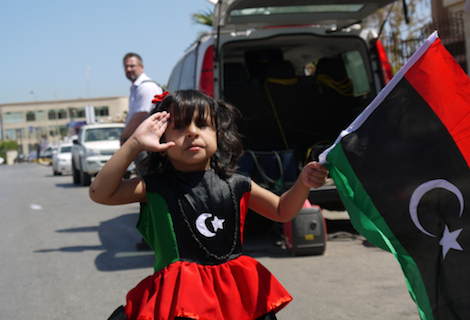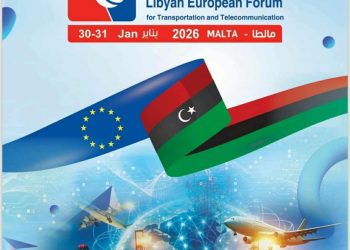By Houda Mzioudet.

Tunis, 23 November:
Libya is set to become “the biggest workshop for jobs and reconstruction in the region”, according to . . .[restrict]National Congress President Mohamed Magarief. The politician made the claim during a visit to Tunisia along with a high-level delegation yesterday.
Stressing the need for greater cooperation between Libya and its neighbours, Magarief also announced delivery of $200 million from Libya to the Tunisian Central Bank as part of a development package boost for Tunisa, whilst calling on experts from across the Arab world to come to Libya and help the recovery.
Magarief was speaking alongside Tunisian President Moncef Marzouki at the Carthage Palace in Tunis, with both men covering a range of other topics including reconciliation, the Israel-Palestine crisis and the conflict in Mali.
The two men also announced their decision to hold off on recongnising the new Syrian National Council for Opposition and Revolutionary Forces until they knew more about its make-up.
“We and Libya are in agreement that we will wait before recognising”, said President Marzouki. “We need to have a real idea about the representation on this body.”
Britain, France, Turkey and the Gulf States have all recognised the new body, which is the successor to the Syrian National Council, as the sole legitimate representative of the Syrian people. Libya was the only country in the world to have previously recognised the old SNC as the sole legitimate representative of the Syrian people.
Together with Magarief was a 25-strong delegation that included other members of the National Congress, members of the Libyan broadcast media and the Libyan Ambassador to Tunis Jamal Jornaz. In addition to meeting President Marzouki, meetings were also held with Tunisian Foreign Minister Rafik Abdessalem and President of the Tunisian National Constitutent Assembly Mustapha Ben Jaafar. The visit comes as part of a four-country tour that is also taking in Saudi Arabia, Egypt and Turkey.
Magarief also extended a hand of reconciliation to Libyans currently in hiding in Tunisia, many of whom were supporters of the former regime, saying they could return to Libya on the assurance they would not be harmed. “The era when Libya banished its children is gone with Qaddafi,” he insisted, adding that those accused of crimes would be afforded a fair and transparent trial as part of a broader move towards reconciliation in Libya.
Nevertheless, he insisted, the perpetratrors of atrocities against Libya during the revolution must be brought to justice, lamenting, “I cannot think of a single crime that was not committed against Libyans”.
With both Tunisia and Libya having experienced revolutions last year, both men said they recognised the importance of the other’s country in enabling these transitions to succeed.
“The Libyan Revolution protected Tunisia’s back against the brutality of Gaddafi”, Marzouki stressed, whilst Magarief thanked Tunisia for all the support it had provided during Libya’s own war of independence.
Both men emphasised the need of their two countries to now help one another with the reconstruction that followed. Magarief called on Tunisians together with all Arabs to come to Libya and contribute to the opening of the Libyan workshop. Graduates in particular were needed, Magarief said.
For his part, Marzouki thanked Libya for the $200 million investment and called on his countrymen to take the initiative to work and invest in Libya, a country he described as an open market for Tunisians.
Beyond the economic sphere, Magarief went on to highlight the “the peculiar specificties” shared between Libyans and Tunisians produced by shared geography, history and faith that go beyond economic and security interests and the need to strenghten them.
Both presidents emphasised the importance of “deep and transparent relations” between both countries and the need to adopt a shared outlook in dealing with regional issues such the reviving of the Arab Maghreb Union, the situation in Palestine and the conflict in Mali.
Earlier this month, the West African regional body ECOWAS agreed to military intervention in Mali after militant Islamists seized control of the north of the country. The crisis has the potential to spill over into the wider region, with Magarief saying yesterday that Libya was “taking the necessary measures to ward off any negative repercussions [of the crisis] on us”.
The situation in Gaza was also a subject of discussion during the conference. Both Magarief and Marzouki reiterated their countries’ support for Palestinians in Gaza through the dispatching of a delegation with humanitarian aid to the Palestinians affeced by Israeli strikes since last week. Fighting halted on Wednesday when the two sides agreed to a ceasefire.
This is the first official visit for Magarief to Tunisia since his election as president of the National Congress in August. It came three days after Magarief’s visit to Saudi Arabia at the start of this week. [/restrict]








